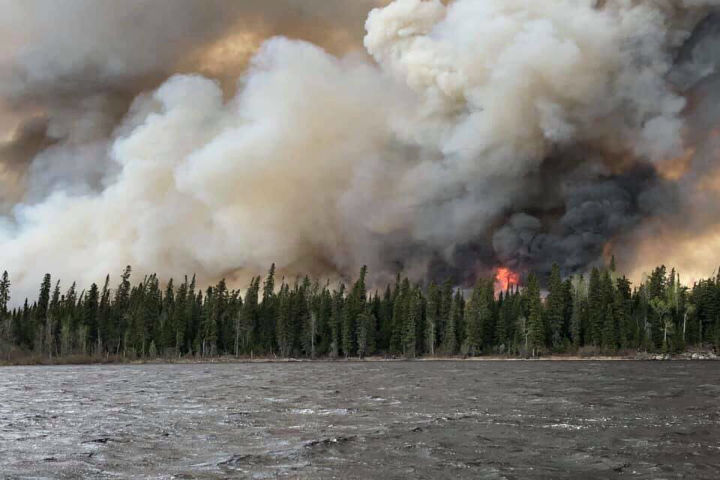A wildfire that has forced about 2,000 people from their homes in northwestern Ontario has begun to slow its spread, officials said Monday.

The forest fire near Pikangikum First Nation started on Wednesday and by Saturday it had grown to 36 square kilometres. A spokeswoman for the Ministry of Resources and Forestry said that on Monday it covered 38 square kilometres.
“The fire has slowed growing, but obviously it’s still something our guys are trying to get under control,” Jolanta Kowalski said. “It is being attacked hard.”
Kowalski said fire crews are bracing for a change in winds.
Environment Canada issued a special air quality statement Monday that the winds could sweep the smoke from Red Lake 14, as it’s officially known, into the nearby First Nation.
“Smoke plumes from a forest fire east of Pikangikum have resulted in deteriorated air quality in the area,” the agency said in its statement.
“Individuals may experience symptoms such as increased coughing, throat irritation, headaches or shortness of breath. Children, seniors and those with cardiovascular or lung disease, such as asthma, are especially at risk.”
Nishnawbe Aski Nation, which represents 49 First Nation communities across northern Ontario, said about 2,000 people have been evacuated from the fly-in community, located about 500 kilometres northwest of Thunder Bay, Ont., to other cities in Ontario and Manitoba.
WATCH: Violence against First Nations, Métis and Inuit women and girls a form of “genocide”: report

The fire has damaged the broadband communications in the area, Nishnawbe Aski Nation said in a statement, knocking out phone and internet service.
“Bell technicians have been allowed to assess the damage in the community but due to weather delays they will not be able to fly into Pikangikum until Tuesday,” Nishnawbe Aski Nation said.
Kowalski said crews are also busy creating a “combustible-free zone” – a lengthy mound of dirt – with bulldozers on the north side of the blaze “so the fire can’t jump it.”
Evacuations continued Monday. The province said all vulnerable people have been transported out of the area.
“At this moment in time, the people who remain in the community are people who don’t want to leave and that lines up with the fact there is no anticipated imminent danger,” said Indigenous Affairs Minister Greg Rickford.
“The fire is managed, but this is always about the smoke and there may be some change in wind direction in the next day or two.”
He said the province remains on guard to evacuate the First Nation completely should the chief make that decision.
WATCH: ‘Very trying past week’ for Dene Tha’ First Nation amid wildfire

- Posters promoting ‘Steal From Loblaws Day’ are circulating. How did we get here?
- Video shows Ontario police sharing Trudeau’s location with protester, investigation launched
- Canadian food banks are on the brink: ‘This is not a sustainable situation’
- Solar eclipse eye damage: More than 160 cases reported in Ontario, Quebec



Comments